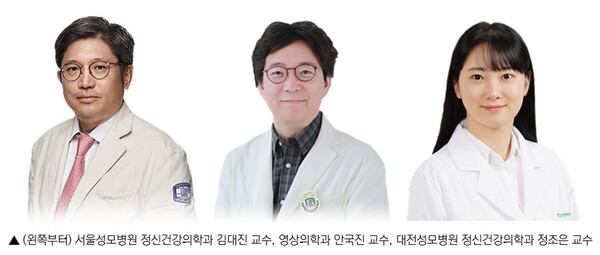Transcranial direct current stimulation (tDCS), a type of electroceuticals, can be used to treat internet gaming disorder, a new study has shown.
A research team -- led by Professor Kim Dai-jin of the Department of Psychiatry at the Catholic University of Korea Seoul St. Mary's Hospital (lead author), Professor Ahn Kook-jin of the Department of Radiology (co-author), and Professor Jeong Jo-eun of the Department of Psychiatry at Daejeon St. Mary's Hospital (first author) -- has been treating 22 men in their 20s with internet gaming disorder at the Seoul St. Mary's Hospital Addiction Clinic since 2018.

Transcranial direct current stimulation is a neuromodulation that stimulates nerve cells in the brain by sending a small direct current through + and - electrodes attached to the skin's surface (scalp) to regulate their function.
The treatment is based on the principle that it first regulates the activity of neurons near the stimulation site. It also affects neural circuits inside the brain by utilizing the characteristics of neurons that form a network connected. According to the researchers, participants in the study performed self-treatment at home for 30 minutes a day for two weeks, following a prescribed method and schedule to deliver electrical stimulation through the dorsolateral prefrontal cortex.
The randomized, double-blind, sham-controlled study showed positive results in the treatment group compared to the control group. Functional MRIs taken before and after treatment showed increased connectivity between the treatment group's anterior insula and dorsolateral prefrontal cortex. That significantly increased self-regulation and had a positive effect on inhibiting responses to addictive objects, the researchers explained.
Addiction disorders are not simply a matter of a person's lack of willpower or habit but rather a brain disorder characterized by a decrease in frontal lobe function. Alterations in the reward system that regulate motivation for pleasurable behaviors lead to increased craving and decreased ability to regulate cognitive functions such as judgment, planning, and self-control, which leads to a vicious cycle of addiction, they said.
Proper treatment requires a systematic approach that recognizes addiction disorders as “something that anyone can suffer from,” just like depression, but social awareness is still somewhat lacking, the researchers noted.
There are no medications approved for treating gaming addiction.
Therefore, the research team hoped that their study could help people with gaming disorder who need systematic management as a new treatment tool other than medication.
"Even if we synthesize more than 200 previous studies, no serious side effects have yet been reported other than temporary discomfort such as itching or heat at the electrode attachment site," Professor Jeong said. "As the electronic drug can be self-applied, it is expected to be an alternative for other addiction patients who are less effective with medication alone, so we are studying its application to treat various addictions in the future."
Professor Kim also said, "As the number of e-drugs approved for therapeutic use by the U.S. Food and Drug Administration and the Ministry of Food and Drug Safety has increased in recent years, the public's interest in them has also increased, and the number of prescriptions has also increased.”
Kim continued, “As they are proving effective in various conditions, such as addiction, depression, and anxiety disorders, in the field of psychiatry, we will strive to provide patients with safer and more effective treatment possibilities through further research."

